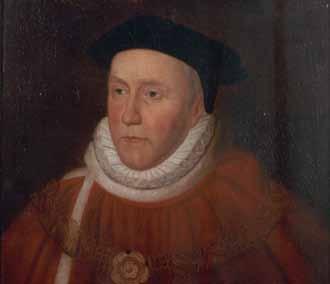
2 minute read
Sir Christopher Wray
By Alec Samuels (1949)
Christopher Wray was born in Yorkshire in 1522. Apparently there was some doubt about his parentage, raised by Lord Campbell that he was his father’s son “by a wench in a belfry”, but this is discredited.
Advertisement

Painting of Christopher Wray.
He may have attended Buckingham/Magdalene but there is no record of admission or residence. What is certain is that in later life he showed remarkable commitment to Magdalene. In 1545 he joined Lincoln’s Inn and in 1550 was called to the Bar, becoming a Bencher in 1553, Reader in 1562, and Treasurer in 1565. He was an MP for various constituencies 1553–1571, in the final year becoming Speaker. The charters, liberties and privileges of the University of Cambridge were confirmed by Queen Elizabeth I largely due to his influence.
In 1572 Wray was appointed a judge, and in 1574 Chief Justice and knighted. He held the office for 18 years. As Chief Justice he presided over many state trials, mostly for conspiracy for treason to dethrone or to assassinate Queen Elizabeth I, such as Edward Campion in 1581, Babington in 1586, Queen Mary of Scots in 1586, and St Philip Howard in 1589. Queen Mary was an embarrassment as a prisoner, as she would have been if released; and assassination and poisoning were seen as un-English. Following the conviction, Queen Elizabeth signed the warrant for execution, which was carried out, causing embarrassment to Elizabeth. Wray rather discreditably managed to lay the sole blame upon Secretary Davison with indiscreet zeal for allowing the warrant to take its course without ensuring that Elizabeth was given the opportunity to revoke it if she might so wish. Wray was said to be “indifferent” to religion, though he was strongly anti-Catholic and strongly disliked the puritans. He believed in the absolute power of the sovereign.
Wray was certainly respected for his demeanour, courtesy, patience, learning and skill. He was an example of what can be done in life by energy and fair character without shining abilities. Being much involved in state trials at a time when the Queen and indeed the nation were threatened from outside, he made little contribution to jurisprudence, although he did help to fashion the modern law of contract.
The College is much indebted to Wray. Taking pity on the poverty of the College, he proved himself a most generous benefactor, paying for a dozen rooms and the street frontage and the gatehouse, and endowing fellowships and scholarships. Indeed it was said that but for his generosity the College might not have survived the 1580s. At his death in 1592 he left legacies to the College. His portrait hangs in the Hall. There is a monument to him in the Church of St Michael, Glentworth, Lincolnshire.
Alec Samuels (1949–1952), formerly Reader in Law in the University of Southampton
www.magd.cam.ac.uk









